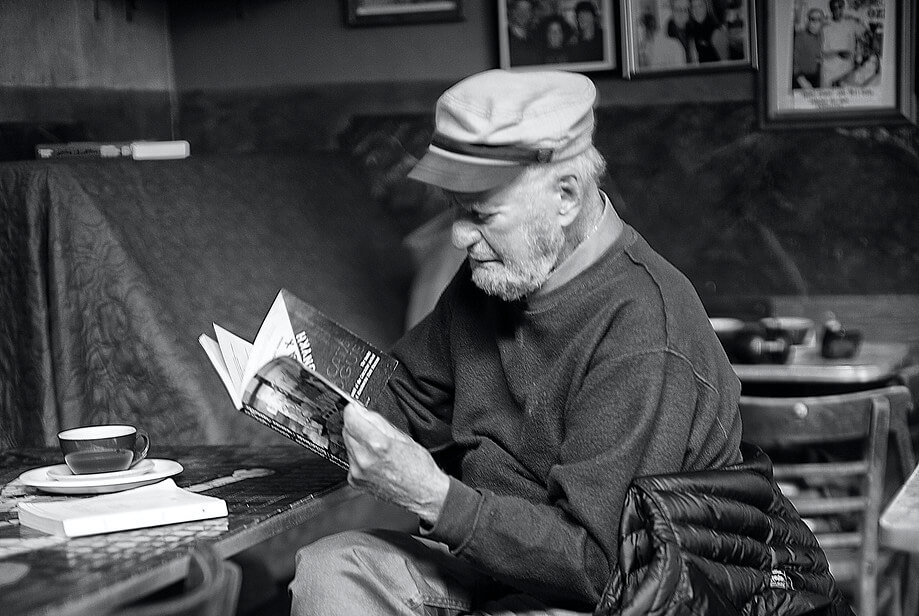The legend breathed for 101 years. Ferlinghetti was a co-founder of City Lights and an American author of magnificent poems that transcend reality while describing its most banal moments.

Robert Diaz. Peninsula 360 Press [P360P].
The spiritual father of the beatnik movement and founder of one of San Francisco's most iconic publishers and bookstores, City Lights - named after the Charles Chaplin film - died at 101 of lung disease, his son Julie Sasser said.
Ferlinghetti is the case of one of those writers who became canon, not only for his importance at the time but also for his activity as an editor, journalist and a disruptor in tune with his fellow Beat writers: Ginsber, Burroughs, Keurac, Kassady and of the not so famous Beat women as were Denise Levertov, Lenore Kandel or Elise Cowen among others, who in addition to their time united them, the taste for the road and travel, sex, orientalism, automatic writing, the alteration of consciousness through drugs and alcohol and the taste for jazz. More than being a style, the beatnik is a moment in which a generation opposes a system that does not give them a place and that on the other hand, they rejected.
Lawrence Ferlinghetti's life was by no means easy. The son of an Italian emigrant who died before he was born, his mother was afflicted by a growing nervous breakdown that forced him to move in with his paternal uncle, Ludovic, and his French wife Emily. Their union would also soon come to an end and Ferlinghetti went to live in France. Back in the U.S. he had to live in an orphanage while his uncle looked for work. He earned a journalism degree from the University of North Carolina, a master's degree from Columbia University and a doctorate from the Sorbonne in Paris. He became a commanding officer during the invasion of Normandy in World War II and upon his return to San Francisco in 1952 he founded with Peter D. Martin, the bookstore and publishing house City Lights where he would quickly face the censorship of the U.S. government who at the end of the war became more conservative than ever by publishing Howl (Howl), from 1956, the famous poem by Allen Ginsberg - dedicated to Carl Solomon, a patient Ginsberg met in a psychiatric hospital - whose beginning marked an entire generation:
"I have seen the best minds of my generation destroyed by madness."
He was accused of printing "obscene books" for this poem, but was acquitted the following year. Lawrence is more than an author who considered himself Beat in the formal terms of the word - the excessive and excessive life - he was more committed to the political struggles and the dream of fabricating new ideals. Let's remember that it was he who defended the publication of Howl, even more than the author himself, and that in his bookstore not only the Beat poets were presented, but it was a forum that for more than 70 years has given space within its walls to the most diverse artistic expressions of the city of San Francisco, which went from being that bohemian cradle of artists to a valley full of transnationals dedicated to technology.
Ferlinghetti was a poet who was cooked in another fire. Although he also made manifestos calling poets to come down from his Elysian Fields to make the revolution and participate in the rebellion, his metaphor occurs on a par with criticism and simplicity. Not for that reason his verses are easy or surrendered, his images are, on the other hand, of a slow temperament, but at the same time caustic.
In the words of the poet and Beat literature expert Jesús Aguado, Ferlinghetti was: "The first to realize what it meant that poetry was political, that is, an instrument of pacification in the service of history, a factory of utopias, the broom truck of those muted by the system, the compass to detect false paths".
Lawrence Ferlinghetti's books are important, for example Pictures of the Gone World from 1955 with which he made his debut as a poet and as an editor in 1955. Another important icon within his career was A Coney Island of The MindThe book of poems, which sold an exorbitant number of over a million copies in 1958, is considered to be his greatest work and was followed by other important titles such as Open Eye, Open Heart 1973 and Love in days of fury1988: "a hybrid artifact of memory and fiction".
Lawrence Ferlinghetti was the conscience of a generation, his poetry has earned immortality, with his verses he mended a path and made a call:
(?)
"All of you ?Poets of the Cities?"
that hang on museum walls, like me,
All you poets of poets who write poetry
about poetry,
All you poets from poetry workshops
in the asshole of America?"
(?)
"Poetry is dead, long live poetry
with terrible eyes and buffalo strength.
Don't wait for the Revolution
or will it happen without you?"
Fragments of the Populist Manifesto


